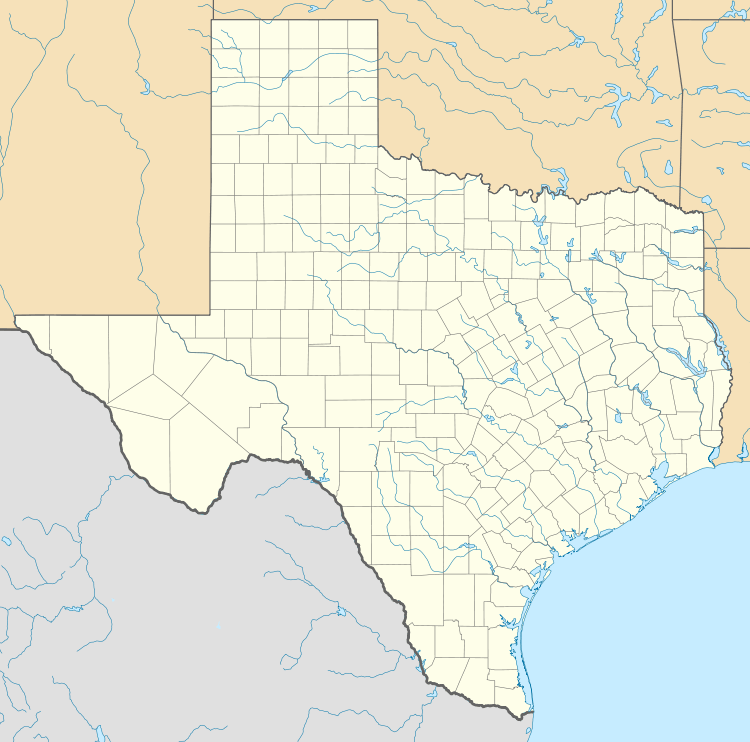El Paso Museum of History
 Entrance to the El Paso Museum of History facing Cleveland Park. | |
 El Paso Museum of History Location within Texas | |
| Established | 1974 |
|---|---|
| Location |
510 N. Santa Fe Street El Paso, Texas |
| Coordinates | 31°45′36″N 106°29′30″W / 31.759998°N 106.491637°WCoordinates: 31°45′36″N 106°29′30″W / 31.759998°N 106.491637°W |
| Type | History Museum |
| Curator | Barbara Angus, Senior Curator |
| Website | Official Site |
The El Paso Museum of History is a museum located in downtown El Paso, Texas which presents information about past 400 years of history in the United States/Mexico border region. The museum has over 16,000 feet of exhibition space.[1] Galleries in the museum feature traveling exhibitions as well as several permanent exhibitions.[1] The museum also presents special programs and has a permanent digital touchscreen wall and a traveling wall. The museum is run by the City of El Paso.[2][3]
History
The museum started out as a Cavalry Museum in 1974.[4] At that time, it mainly featured information about "the mounted history of the West" and was considered a "must for horse freaks."[5] In 1980, the name was changed to the El Paso Museum of History.[4] The museum was supervised by the El Paso Museum of Art director until the El Paso Museum of History hired its own director in December 1990.[6]
The museum's building was considered undersized and in a poor location, so in 2000, the museum was included as part of a bond issue to build a new museum.[4]
The new building, downtown, opened on June 16, 2007.[4] After one year in its new location the museum saw more than 30,000 visitors.[4] The museum is credited with helping "rejuvenate downtown El Paso."[3]
Wall of Giants
The El Paso Museum of History is part of an annual project, called the Wall of Giants, to honor a person, entity, location or event that has had an ongoing impact on the city.[7] The honoree is chosen by a community group called the Circle of Giants.[7]
- 1st Wall of Giants: Don Haskins and Glory Road.[8]
- 2nd Wall of Giants: Farah Manufacturing Inc.[8]
- 3rd Wall of Giants: El Paso's Mayors.[8]
- 4th Wall of Giants: The Missions and Their People.[9]
- 5th Wall of Giants: University of Texas at El Paso.[10]
- 6th Wall of Giants: Fort Bliss.[7]
Digital Wall

The large touchscreen digital wall, known as "Digie" opened on February 14, 2015.[11] It is the second digital wall in the world and the first in the United States.[11] The wall is made of "five massive touch screens" and presents an interactive, three-dimensional view of the history of El Paso, starting in the late 1600s.[12] Each touch-screen is at 95 inch LED and the digital content is networked to other digital walls in other cities.[13] The wall itself is forty feet long by six feet high.[14] There is also a smaller companion wall which is mobile and able to visit schools, malls and community centers.[14] Digie allows visitors to interact with the wall by searching for information or just by browsing the images shown.
Digie stands for Digital Information Gateway in El Paso.[11] Ideas for names for the wall were submitted by community members.[15] El Paso residents, visitors or former residents are invited to share their own pictures and videos relating to El Paso with the museum and be shown on Digie.[16][17] All pictures are screened first by the curator of Digie, Everett Thomas.[14] The wall is not only a place to view pictures and videos, but it also stores and archives these materials.[14]
The digital wall cost around three million dollars to build and was funded by a 2012 bond issue.[18] The idea for the wall dates back to 2011, when Julia Bussinger, the director of the El Paso Museum of History met with the Copenhagen museum director at a conference.[14] The two directors discussed having the next digital wall in El Paso.[14] Copenhagen was the location of the first digital wall of its kind in the world.[11]
See also
References
- 1 2 "El Paso Museum of History". Visit El Paso Texas. Destination El Paso. Retrieved 11 May 2015.
- ↑ "El Paso Museum of History". El Paso Museum of History. City of El Paso. Retrieved 14 May 2015.
- 1 2 "El Paso's Cultural Treasures Bring Treasure Trove of Economic Activity". Texas Cultural Trust. Retrieved 20 May 2015.
- 1 2 3 4 5 "El Paso Museum of History Celebrates New Site". Humanities Texas. May 2008. Retrieved 11 May 2015.
- ↑ "Calvary Museum". Texas Monthly. 5 (9): 37. September 1977. ISSN 0148-7736. Retrieved 11 May 2015.
- ↑ Curlee, Kendall (12 June 2010). "El Paso Museum of Art". Handbook of Texas Online. Texas State Historical Association. Retrieved 11 May 2015.
- 1 2 3 "El Paso Museum of History Celebrates Fort Bliss with Downtown Parade, Wall of Giants Dedication". El Paso Proud. 30 April 2015. Retrieved 11 May 2015.
- 1 2 3 Bussinger, Julia; Angus, Barbara (January 2014). "Can We Stand Alone? Two Case Studies from the El Paso Museum of History" (PDF). CAMOCnews: The Collections and Activities of Museums of Cities. Retrieved 11 May 2015.
- ↑ "EP Museum of History to Open New Wall of Giants Exhibit". Living City Project. 7 December 2012. Retrieved 11 May 2015.
- ↑ Muñoz, Jessica Molinar (18 February 2014). "Mayoral Proclamation: Celebrating UTEP's Centennial Day". Centennial Celebration. University of Texas at El Paso. Retrieved 11 May 2015.
- 1 2 3 4 "'Digie' opens at El Paso Museum of History". El Paso, Inc. 24 February 2015. Retrieved 9 May 2015.
- ↑ "Digital Exhibit at El Paso Museum of History is Link to the Past". The Washington Times. 15 February 2015. Retrieved 11 May 2015.
- ↑ Martinez, Jesse (10 February 2015). "El Paso's History Goes High-Tech with First Digital Wall in the U.S.". KFOX14. Retrieved 11 May 2015.
- 1 2 3 4 5 6 Martinez, Victor R. (18 November 2014). "El Paso Museum of History Accepting Photographs for its 3-D Digital Wall". El Paso Times. Retrieved 11 May 2015.
- ↑ "El Paso Museum of History looking for name of its 3D Digital Wall". KVIA. 21 March 2014. Retrieved 11 May 2015.
- ↑ "Digie". Digie. El Paso Museum of History. Retrieved 11 May 2015.
- ↑ Candelaria, Adriana (14 February 2015). "El Paso Draws Curtain on Digital Wall Downtown". KFOX14. Retrieved 11 May 2015.
- ↑ "Touch City 3D Wall". El Paso County Historical Society. Retrieved 11 May 2015.